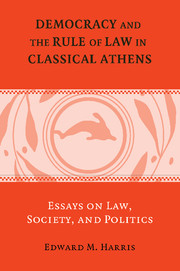Book contents
- Frontmatter
- Contents
- PREFACE
- ACKNOWLEDGMENTS
- ABBREVIATIONS
- INTRODUCTION
- I LAW AND CONSTITUTIONAL HISTORY
- II LAW AND ECONOMY
- III LAW AND THE FAMILY
- 1 Did the Athenians Regard Seduction as a Worse Crime than Rape?
- 2 Did Rape Exist in Classical Athens? Further Reflections on the Laws about Sexual Violence
- 3A Women and Lending in Athenian Society: A Horos Re-Examined
- 3B Notes on a Horos from the Athenian Agora
- 4 The Date of Apollodorus' Speech against Timotheus and Its Implications for Athenian History and Legal Procedure
- 5 A Note on Adoption and Deme Registration
- IV ASPECTS OF PROCEDURE
- V ENVOI
- BIBLIOGRAPHY
- INDEX LOCORUM
- SUBJECT INDEX
5 - A Note on Adoption and Deme Registration
Published online by Cambridge University Press: 25 February 2010
- Frontmatter
- Contents
- PREFACE
- ACKNOWLEDGMENTS
- ABBREVIATIONS
- INTRODUCTION
- I LAW AND CONSTITUTIONAL HISTORY
- II LAW AND ECONOMY
- III LAW AND THE FAMILY
- 1 Did the Athenians Regard Seduction as a Worse Crime than Rape?
- 2 Did Rape Exist in Classical Athens? Further Reflections on the Laws about Sexual Violence
- 3A Women and Lending in Athenian Society: A Horos Re-Examined
- 3B Notes on a Horos from the Athenian Agora
- 4 The Date of Apollodorus' Speech against Timotheus and Its Implications for Athenian History and Legal Procedure
- 5 A Note on Adoption and Deme Registration
- IV ASPECTS OF PROCEDURE
- V ENVOI
- BIBLIOGRAPHY
- INDEX LOCORUM
- SUBJECT INDEX
Summary
the athenian law of adoption allowed a man who had no γνήσιοι children to adopt a son to serve as his κληρονόμος. As part of the process of adoption, the adopted son was entered on the deme register of his adoptive father. After the process was completed, the adopted son lost all rights of inheritance in his natural family. The adopted son might return to his natural family on one condition – that he left a son in the household of his adoptive father to serve as κληρονόμος.
L. Rubinstein has recently claimed on the basis of [Dem.] 44 that an “adopted son ceased to be a member of the deme of his adoptive father when he returned to the family of his natural father.” Yet she admits that “there is no information as to whether there was any procedure of readmission when he returned to the deme of his natural father.” I will argue that the evidence found in [Dem.] 44 indicates on the contrary that the adopted son who chose to return to the household of his natural father retained his membership in the deme of his adoptive father. This interpretation of the evidence found in the speech will enable us to understand how Clearchus, the son and κληρονόμος of the general Nausicles, came to have a different demotic from that of his father.
When analyzing the statements of the speaker in [Dem.] 44, it is necessary to keep several considerations in mind. First, the speaker presents only one side of the case – the speeches delivered by his opponents Leostratus and Leochares have not been preserved.
- Type
- Chapter
- Information
- Democracy and the Rule of Law in Classical AthensEssays on Law, Society, and Politics, pp. 365 - 370Publisher: Cambridge University PressPrint publication year: 2006
- 1
- Cited by



